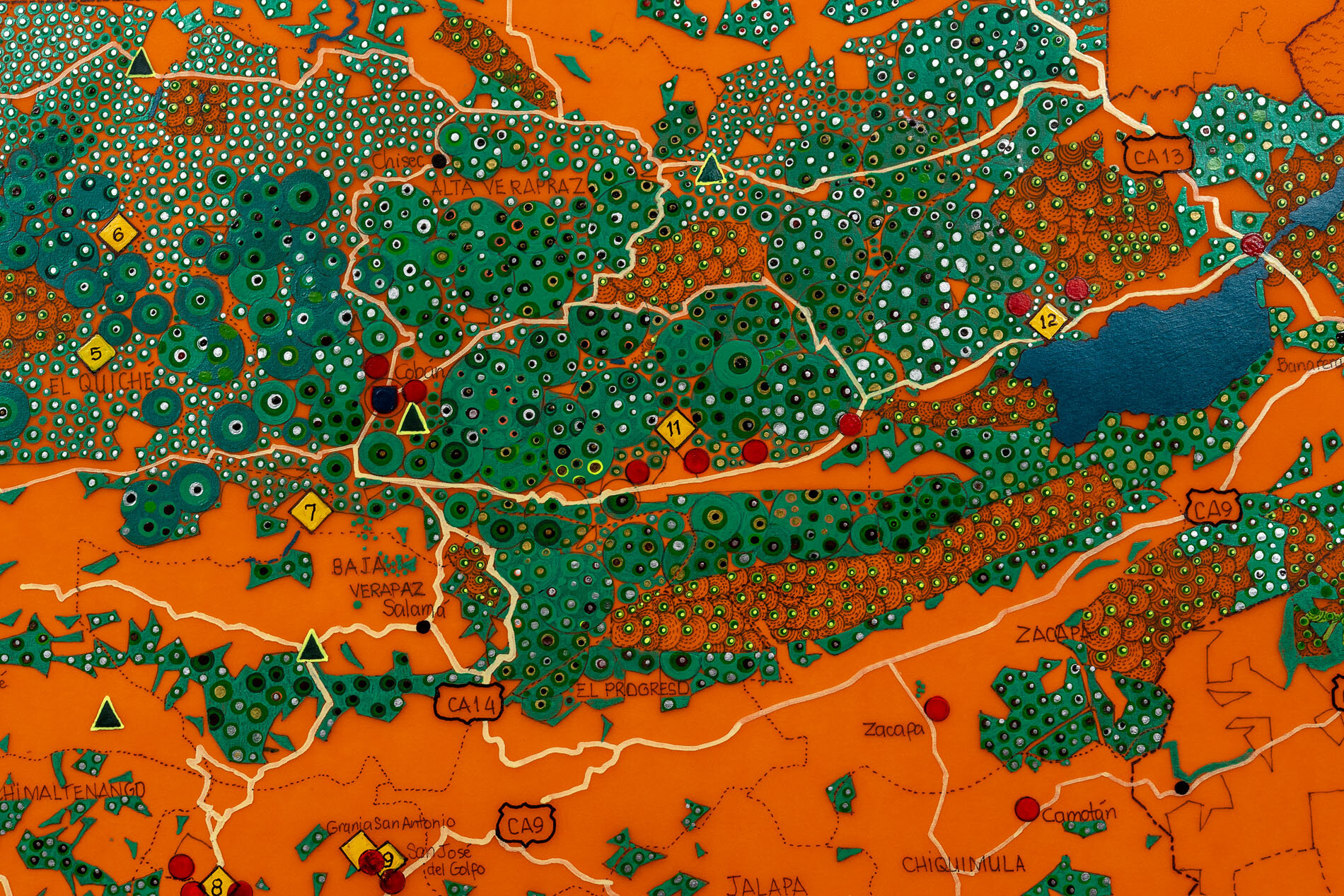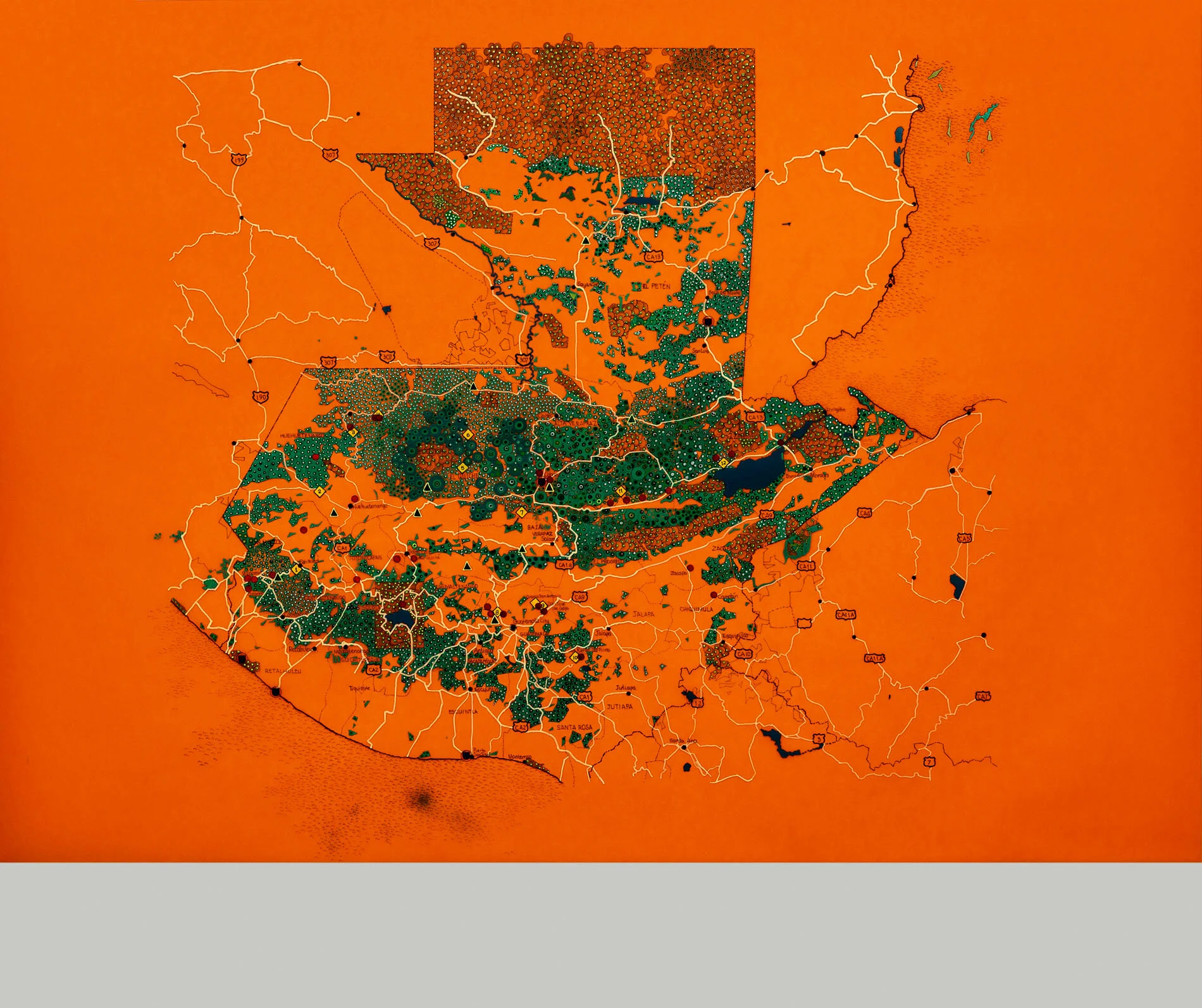
The Guatemala Project | 2019-2020
El Pulpo: UFCo’s Great White Fleet routes and properties in Central America & the Caribbean | 2019 | 137 x 137 cm
Guatemala Agrarian Reform vs. CIA Operation PBSUCCESS | 2019 | 101.6 x 68.58 cm [designed by Jorge L. Hurtado]
Guatemala: UFCo PBSUCCESS 06.1954 | 2019 | 76.2 x 100.33 cm
CIA Study of Assassination sketch | 2019 | ink, acrylic, oil on paper | 30.5 x 30.5 cm
Ministry of Propaganda, Guatemala: steps towards a new intelligence system | 2019 | 28 x 37.34 cm each [illustrations by Jorge Hurtado based on archival CIA stick figure sketch]
Guatemala Memorial-selected names from Diario Militar & GHRC Tracking Human Rights | 2019
25.5 x 35.6 cm each [120 pieces] | overall dimension: 305 x 357 cm
Guatemala-Memory of Silence, CEH report: number of massacres by Department | 2019 | 96.5 x 63 cm
Guatemala Human Rights Commission: selected cases of violence in relations to current mega projects | 2019 | 71 x 88.3 cm
Guatemala-an attribution to CEH Memory of Silence | 2020 | 43 x 35.6 cm
Northern Triangle, Central America | Center for Immigration Studies: number of immigrants in the U.S. (1970-2018) & DHS: 'aliens' apprehended by CBP (FY 2016-2018) | 2020 | 57 x 40.6 cm
United Fruit Company’s (UFCo) exclusive power in Central America and the Caribbean started in the beginning of 1900s and foregrounded U.S. policy towards Guatemala for many years to come. Unpacking the United States’ history of commercial interest intertwined with political influence in Guatemala provides a window into the country’s modern history of violent conflicts and its population’s continuous northward migration. Within the premise of this project, Chung constructed its conceptual framework based on four key components: the history of UFCo’s monopoly and influence in Guatemala’s economy and politics; the U.S. Cold War policy towards Guatemala exemplified in the 1954 CIA-engineered coup d’etat deposing President Jacobo Árbenz; the civil war period (1960-1996) including the Guatemalan military massacre of indigenous peasants (1982) and the extrajudicial forced-disappearances and killings of Guatemalans in the capital by the National Police’s Death Squad (1983-1985); the continuous violence linked to current transnational mega-projects taking place mainly in the highland of the country. The mixed-media works are the results of a painstaking research Chung undertook, culling materials from various sources such as books Bitter Fruit, Shattered Hope, Paper Cadavers: The Archives of Dictatorship in Guatemala, and Guatemala Never Again: the Official Report of the Human Rights Office, Archdiocese of Guatemala; archival documents from the CIA Historical Review Program, Operation Sofia, and Diario Militar; data from the Guatemala Human Rights Commission and of other sources to map the industrial sites where recent attacks of indigenous people took place.
[The Guatemala Project is in part a collaboration between Chung, Stuardo A. Mejia, and Jorge L. Hurtado.]
Related Exhibitions:
No Man's Land | Station Museum, Houston | 2020
Passage of Time | Tyler Rollins Fine Art, New York | 2019





![Guatemala Agrarian Reform vs. CIA Operation PBSUCCESS | 2019 | 101.6 x 68.58 cm [designed by Jorge L. Hurtado]](https://images.squarespace-cdn.com/content/v1/604be7479e88d2344efa06fb/c37607b2-5e26-4b52-8596-86571612e0e4/Decree+900+PBSUCCESS.jpg)



![Ministry of Propaganda, Guatemala: steps towards a new intelligence system | 2019 | 28 x 37.34 cm each [illustrations by Jorge Hurtado based on archival CIA stick figure sketch]](https://images.squarespace-cdn.com/content/v1/604be7479e88d2344efa06fb/4b327396-7cd4-4e91-9109-2d43f593780b/14.CIA+new+intelligent+system+steps.jpg)

![25.5 x 35.6 cm each [120 pieces] | overall dimension: 305 x 357 cm](https://images.squarespace-cdn.com/content/v1/604be7479e88d2344efa06fb/8624a2bc-abbd-4a74-b808-0545ba5bfd5f/10a.GTP.jpg)



